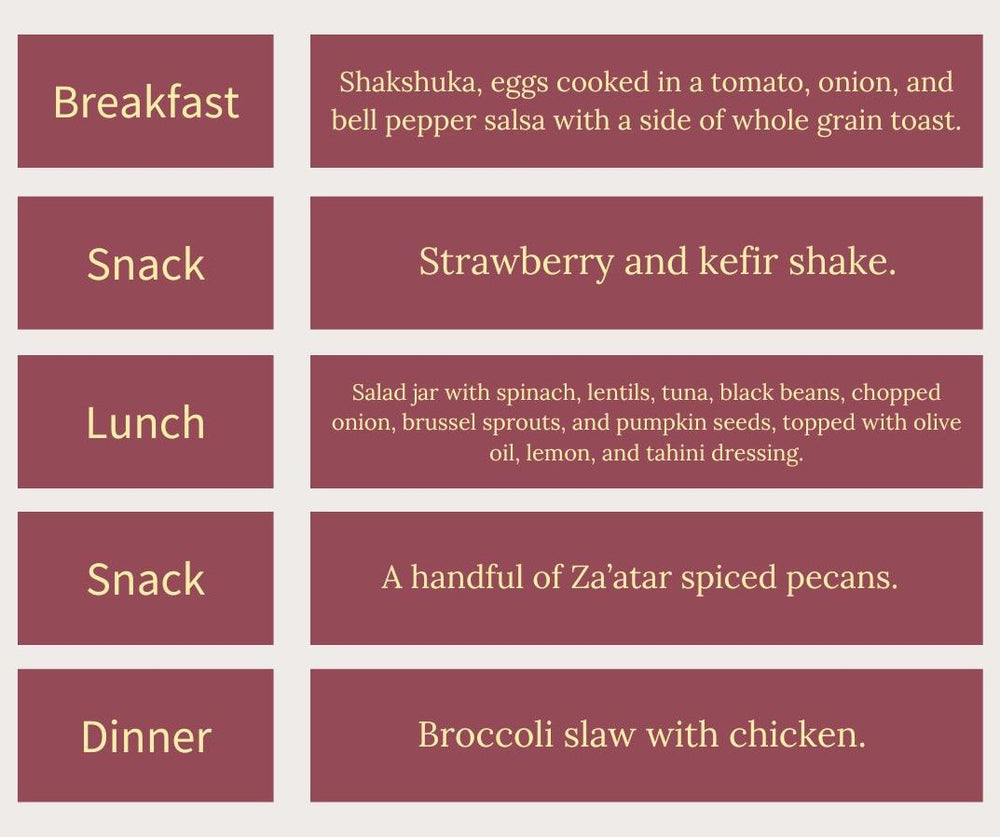MIND Diet Gut-Brain Health: Your One Day Meal Plan

Given that our diet has a major impact on our gut microbiota, it’s vital we make notice of our dietary choices. Not only does the food you eat affect your gut, but in turn your brain. The gut and the brain are intimately connected by a bi-directional communication network which involves several key systems. This intricate two-way street allows the brain to influence the gut’s immune cell response, while the gut plays an important role in cognition and mood.1 A diet that incorporates essential nutrients is the Mediterranean Diet, which is rich in fiber and has been associated with higher gut microbial diversity.2 The MIND diet however, is an adaptation of the Mediterranean diet and the DASH diet, with a higher focus on limiting sweets and fried foods, foods that can cause microbiome distress and havoc.
If you’re looking to improve your gut health, make gradual changes to your diet that can be easily incorporated into your daily routine over time. This approach is more sustainable and can help you establish lifelong healthy eating habits. It’s important to note that changes in your microbiome and cognitive function may take time to notice. Therefore, it’s essential to embrace gradual adjustments to your diet and make them a part of your eating routine over time.
Embrace Simple Approaches to Start Your Gut-Brain Food Journey:
- Find ways to incorporate both probiotics and prebiotics into your daily diet. Add in fermented foods like pickles or kimchi to help promote beneficial gut bacteria. Reduce insoluble fiber and instead increase soluble fiber like oats, barley, and beans.
- Swap refined sugar. Replace refined sugar with natural sweeteners like honey, maple syrup, or dates in your recipes for a healthier alternative.
- Consume less processed foods. Processed foods can trigger inflammation and kill off many of the good bacteria in your gut due to their high sugar, fat, and salt content. Limit fast foods, sodas and juice, and preserved deli meats as much as possible.
- Eat more polyphenols-rich foods. Polyphenols are natural plant-based antioxidants that provide a probiotic boost for beneficial gut bacteria. Flavonols found in colorful vegetables, grapes and berries, and dark leafy greens help to encourage the growth of healthy gut bacteria.
- Choose fatty fish as your protein sources. Omega-3s and vitamin B3, and B12 are found in fatty fish, all helping to promote a healthy gut.
After previously identifying the top 11 nutrients for gut care, we’ll now incorporate these dietary principles into a one-day meal plan below. This plan has been devised to offer you a glimpse into a day of eating that can help you nourish your gut and brain. You can easily incorporate a selection from the options below to replace snacks or meals, ensuring you enjoy a beneficial intake of gut-boosting nutrients.
Sample One-Day Meal Plan for Gut-Brain Healthy Eating:
Breakfast: Shakshuka, eggs cooked in a tomato, onion, and bell pepper salsa with a side of whole grain toast.
Shakshuka is a traditional Mediterranean breakfast dish that is both delicious and highly customizable. Eggs are a good source of vitamin B12, while tomatoes, onions, and peppers are rich in polyphenols, especially quercetin.
Snack: Strawberry and kefir shake.
Strawberries contain a good source of anthocyanins, while kefir is a powerful probiotic, which can help increase good bacteria gut levels.
Lunch: Salad jar with spinach, lentils, tuna, black beans, chopped onion, brussel sprouts, and pumpkin seeds, topped with olive oil, lemon, and tahini dressing.
Spinach and brussels sprouts are rich in vitamin B9 (folate) and zeaxanthin, great for your intestinal lining.
Snack: A handful of Za’atar spiced pecans.
A variety of nuts are packed with vitamin E, which has a role in affecting the diversity of your gut bacteria.
Dinner: Broccoli slaw with chicken.
Chicken can be a nice alternative if you aren’t a fan of fish as it contains vitamin B3, paired with more polyphenol rich vegetables to help reduce gut inflammation.
Remember that every step you take to embrace a gut-boosting diet propels you in the right direction, drawing you nearer to enhanced gut and brain wellness. Begin by introducing minor adjustments, progressively integrating more as you find your rhythm. Every stride you take contributes to elevating your gut health and your brain health as well.
When you sense a gap in your nutritional approach, consider integrating RELEVATE into your routine. Scientifically formulated with the principles of the Mediterranean and MIND diets, RELEVATE delivers 17 vital nutrients essential for fostering lasting brain health which can also help to benefit your gut health. Discover how RELEVATE can be a helping hand in supporting cognitive well-being by visiting here.
References
- Lima-Ojeda, J M et al. “Darmflora und Depression : Pathophysiologie der Depression: Hypothalamus-Hypophysen-Nebennierenrinden- und Mikrobiota-Darm-Hirn-Achse” [Gut microbiota and depression : Pathophysiology of depression: hypothalamic-pituitary-adrenal axis and microbiota-gut-brain axis]. Der Nervenarzt vol. 91,12 (2020): 1108-1114. doi:10.1007/s00115-020-01029-1
- Nagpal, Ravinder et al. “Gut microbiome-Mediterranean diet interactions in improving host health.” F1000Research vol. 8 699. 21 May. 2019, doi:10.12688/f1000research.18992.1


